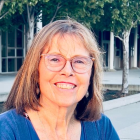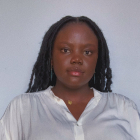These in-their-own-words pieces are told to Patricia Lane and co-edited with input from the interviewee for the purpose of brevity.
Celine Isimbi empowers her fellow university students to link their concerns to climate justice. This 23-year-old University of Waterloo student brought together advocates for student issues, including affordable housing, health care, low wages, personal safety, racialization impacts and others in the UW Climate Justice Ecosystem to speak with a common voice.
Tell us about your project.
Toward the end of our second year, my co-founder Michelle Angkasa and I realized we had many regrets about both our own experiences as students and others on this campus. As a Black woman, my safety had been threatened without appropriate institutional protection. International students often worked to cover living expenses but were not paid a living wage. Many of our fellow students were hungry and inadequately housed.
Much of this suffering was silent. Advocates were working in silos. Michelle and I wanted to bring people together and bring the suffering out into the open. When we did, all could see that the injustices are linked to the same forces burning our planet.
Under the broad umbrella of climate justice, we came up with 10 demands to make life livable for everyone in the university community, which would also build community resilience in a warming world. In September 2023, we presented and published an open letter to the president signed by 200 university community members with 10 demands, including taking responsibility for student housing of all kinds, improving campus security and accelerating education about the impacts of climate injustice on racialized and Indigenous people. Over 100 attended a protest on campus.
More recently, we decided to focus on housing and divestment. We are drawing attention to Waterloo’s growing encampment of the unhoused as we remind university decision-makers they must take responsibility, not just for building more housing, which they say they will do, but for affordable climate-adapted shelter right now.
We are also working with Change Course, a student movement to kick banks off campus and disrupt bank financing for the oil, gas and coal industries. The University of Waterloo committed to divest in 2021, which is not fulfilled. Since then, money has poured in from the Royal Bank, in particular, for funding environmental science programs and other greenwashing efforts. Last year, its CEO was awarded an honorary doctorate. It makes no sense to support my education by funding the destruction of my future.
Tell us about your background.
I came to Canada in 2019 with my mother from South Africa, where we had been refugees from Rwanda for 18 years. I am acutely aware of the disempowerment that comes from being reliant on other people’s mercy. I am grateful for my education, but it should be a right and not the result of philanthropy.
In Cape Town, I volunteered at the aquarium and thought I would study marine biology. But I became aware of the “Fees Must Fall'' student movement protesting the apartheid-style, discriminatory education-funding models that remain. In 2018, a serious drought threatened the entire water supply. I saw that even though this was a community-wide crisis, those who lived in wealthy, usually white communities or who could drive to the natural springs had water while the rest of us did not. I realized to solve the climate crisis, we must end economic inequality and racial discrimination. This led me to choose to study environmental sciences and political science.

What makes your work hard?
The voices of Black, racialized or Indigenous youth matter less than those who are white and older. Our expertise about our own experience is often invalidated.
What keeps you awake at night?
So many terrible things are happening to so many people in so many places all at once. It can be hard to stay engaged. But the people I work with at my university and globally inspire me and give me hope. They are not here for the titles or the salaries. They are working tirelessly because they care.
What do you see if you get this right?
We will have a world where anyone has the right to play in the woods without fear for their safety or take a walk on a sunny day instead of going to their second or third job. Education will be offered just because we are human.
What would you like to say to other young people?
You are not alone, and you are not going insane. Sometimes, it can feel unapproachable. But if we are going to tell a new story about what it means to be a human, we need your voice and your passion.
What about older readers?
Support young people. Yes, sometimes we have to shout, but that is not all we are, and we really need your experience and wisdom.
And to everyone, I would say: Dive in. If you come with a foundation of care, you bring what we need. The rest will become obvious as you get involved.







Comments
Thanks for your work Celine - and all of the youth climate justice activists!